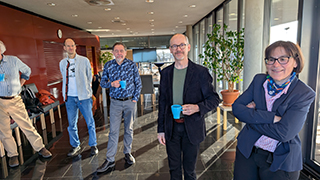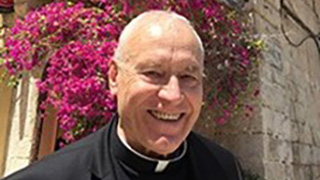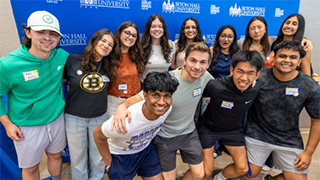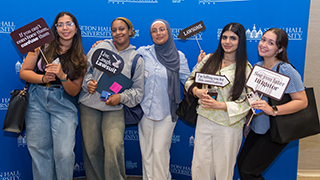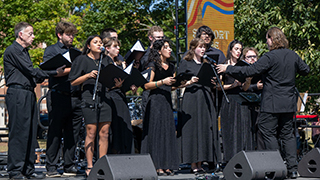Computer Science Professor Marco Morazán Earns Top Honor at CSEDU 2025 for Student-Centered Programming Research
Thursday, November 13, 2025

Marco T. Morazán , Ph.D., Professor, Computer Science Graduate School Advisor, Department of Mathematics and Computer Science.
At the 17th International Conference on Computer Supported Education (CSEDU), held in Porto, Portugal, from April 1 to 3, 2025, Marco T. Morazán, Ph.D., was selected by the CSEDU committee for the conference’s Best Paper Award for his work, “Grammar Verification for Students: A Grammar Design Recipe with Verification Steps.” Morazán is a professor and Graduate School advisor in the Department of Mathematics and Computer Science at the College of Arts and Sciences. This work is of a piece with his long-standing focus on the intersection of programming languages and computer science education. It guides students in moving from the familiar intuition of everyday grammar rules, such as noun-verb-noun, to the kind of structured, verifiable grammars required in computer science, built step by step and checked for correctness. Sitting firmly within his long-term research agenda, the paper carries forward his vision of embedding systematic program design into the heart of the computer science curriculum.
This agenda has grown steadily across courses and over the years. For beginners, Morazán developed an innovative curriculum for programming using systematic problem solving and video game development, supported by two textbooks he published with Springer: Animated Problem Solving: An Introduction to Program Design Using Video Game Development (2022), and Animated Program Design: Intermediate Program Design Using Video Game Development (2022).
The strongest proof of concept is what Morazán’s students accomplish alongside him. In 2024 and 2025, Morazán and his Seton Hall students, including recent alumni, published fifteen peer-reviewed articles. This body of work traces the evolution of Functional State Machines (FSM), a new programming language created by Morazán and his SHU undergraduate research assistants, as well as the teaching methodology that has grown around it. In addition, five more manuscripts co-authored with Seton Hall students are currently under review, and Morazán has two solo papers in review that extend AI-assisted program design through structural and generative recursion. Moreover, he was invited by the organizers of the 37th Symposium on Implementation and Application of Functional Languages (IFL 2025) to deliver a tutorial on Seton Hall’s programming-based methodology for teaching theoretical computer science.
Students from the Department of Mathematics and Computer Science have carried that momentum forward into advanced research and graduate study. In 2024, Morazán’s undergraduate research assistant Oliwia Kempinski graduated and was admitted to the Computer Science Ph.D. program at the University of Maryland. In 2025, another of his undergraduate research assistants, Tijana Minic, followed suit and was admitted to the Computer Science Ph.D. program at the University of Washington; both ranked among the top computer science programs nationwide.
Morazán’s current students continue to move the work forward. Andrés Maldonado focuses on the design and implementation of domain-specific languages (DSLs) and on visualization optimization. He was selected to present at the Association for Computing Machinery (ACM) Student Research Competitions, first at the Systems, Programming, Languages, and Applications: Software for Humanity (SPLASH) 2024 conference in Pasadena, California, and later at the International Conference on Functional Programming (ICFP) 2025 in Singapore. David Anthony K. Fields studies the dynamic visualization of state machines and context-free expressions. He advanced to the final round of the SPLASH 2025 ACM Student Research Competition in Singapore. Sophia G. Turano continues this trajectory with her work on automatic validation and testing for finite-state machines, capturing the spirit of collaboration and excellence at the heart of the Department of Mathematics and Computer Science.
Further extending Morazán’s agenda, in his Formal Languages and Automata Theory course, he and his SHU undergraduate research assistants created a new programming language, Functional State Machines (FSM), which allows students to systematically implement theoretical concepts as executable programs. As part of this curriculum, he published his third textbook with Springer: Programming-Based Formal Languages and Automata Theory (2023), and the article selected for the Best Paper Award at CSEDU 2025 was further developed from this work.
Looking ahead, Morazán is devoted to designing an innovative and highly practical curriculum that prepares students to systematically design and implement programs, with AI as a collaborative assistant. “AI is not going to make programmers obsolete,” Morazán says. “On the contrary, it will require programmers to master a new skill, prompt engineering, so they can apply artificial intelligence effectively to programming and problem solving,” he explains. To advance this vision, he has authored a fourth textbook, AI‑Assisted Program Design: An Introduction to Prompt Engineering Using Python and GitHub Copilot, forthcoming from Cambridge Scholars Publishing.
Categories: Science and Technology


